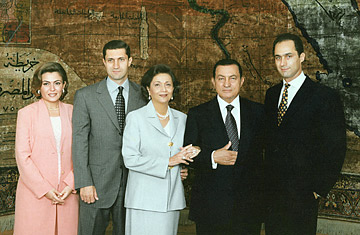
Former Egyptian president Hosni Mubarak (second from right) and his wife Suzanne (center) pose with their two sons Gamal (right) and Alaa (second from left) and the latter's wife Heidi al-Sakher, (left).
(2 of 2)
To Egyptian investigators, the matter of paperwork is proving burdensome — and a task for which they may not be prepared for. They are frustrated by the fact that governments in Europe and the United States demand legwork — and paperwork — to locate the evidence needed to prove the case against the Mubaraks in court and, just as importantly, to physically return a lot of the allegedly stolen money to Egypt's coffers. "The countries who control those accounts are making really difficult demands in order to remove the privacy for those accounts," says Assem al-Gohary, Egypt's Deputy Minister of Justice, and the chairman of the committee tasked with recovering the stolen assets. "You as a reporter should tell the countries that they need to help us by loosening the conditions."
On a busy Sunday at the Justice Ministry in downtown Cairo, Asser Mahmoud Harb, an official on the team tasked with locating Mubarak's foreign assets, says his job is so much more difficult than it needs to be. He complains that the general prosecutor's office — which is looking into charges that Mubarak and members of his entourage ordered violence against civilians — has an easier task because it can rely on testimonies alone. They don't need bank statements, he says. "They have the option of relying on witnesses. For proving wealth, we have to get documents for everything." Each state in the European Union has different demands, says Harb. "Furthermore the European Union decision [to preemptively freeze accounts belonging to Egypt's and Tunisia's corrupt leaders] only covers accounts under the personal names of the accused. It does not include accounts under business names."
Western diplomats in Cairo argue that there's nothing unusual about their governments' procedures, but they do admit that mismatched legal standards have slowed the process of reclaiming allegedly purloined assets. Still, one high-ranking Western official was bewildered by what Egyptians claimed was a hefty file full of evidence to facilitate access to various accounts. Much of the file turned out to be little more than personal testimonies, the official said, not the hard documents needed to overrule privacy laws protecting bank accounts.
Meanwhile, some observers caution that the loud calls for revenge may not serve the cause of justice either. They argue that anger and the threat of huge protests in Tahrir Square may simply force the military to set up kangaroo courts and sentence certain officials to appease the mob. "They are angry. And anger blocks clear vision," says Leila Takla, a prominent law professor and women's rights activist, and a former member of parliament for the recently-dissolved ruling party. "I don't think the shouts and screams in Tahrir should be the decisive factor. It should run within the rule of law and due process." Indeed, even activists like Sherif believe that it was hardly coincidental that Mubarak and his sons were only detained after a weekend of renewed protests in Tahrir Square.
The Justice Ministry says the Mubaraks were detained when they were because that's how long it took investigators to gather enough evidence to order their arrest. Several other members of the ex-regime, including the much-hated ruling party bigwig and steel tycoon Ahmed Ezz, and ex-interior minister Habib al-Adly were rounded up two months ago. But the fact that a formerly untouchable clas of wealthy and powerful politicians are now in prison remains, for post-revolutionary Egypt, one of the most surprising and shocking of developments.
